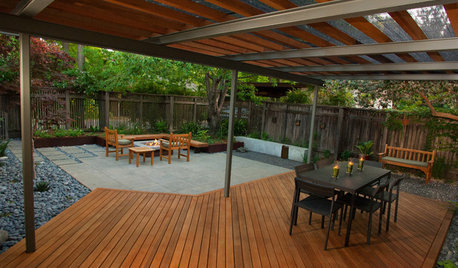Vinegar ...revisited!
beeman_gardener
12 years ago
Related Stories

ORGANIZINGGet It Done: Organize Your Kitchen Cabinets
You deserve better than precarious piles of pots and toppling towers of lids. Give cabinet chaos the boot with these organizing strategies
Full Story
PATIOSPatio Details: Simple Materials Make for a Sophisticated Space
Low water bills and minimal maintenance are just part of the beauty of this handcrafted backyard deck and patio
Full Story
ENTERTAININGSimple Pleasures: The Reimagined Potluck
Party guests can bring more to the table than just the food. Enlisting help with setup, decorations and drinks spreads the work and the fun
Full Story
KITCHEN DESIGN10 Ways to Design a Kitchen for Aging in Place
Design choices that prevent stooping, reaching and falling help keep the space safe and accessible as you get older
Full Story
TRADITIONAL ARCHITECTUREHouzz Tour: Caretaking a Handsome Yonkers Foursquare
Thoughtful updates make a New York couple’s home ‘more of what it already was,’ says the architect-owner
Full Story
DECLUTTERING10 Types of Clutter to Toss Today
Clear the decks and give the heave-ho to these unneeded items
Full Story
REMODELING GUIDES9 Hard Questions to Ask When Shopping for Stone
Learn all about stone sizes, cracks, color issues and more so problems don't chip away at your design happiness later
Full Story






ericwi
beeman_gardenerOriginal Author
Related Professionals
Salem Landscape Architects & Landscape Designers · Harvey Landscape Architects & Landscape Designers · Buford Landscape Contractors · Concord Landscape Contractors · Bristol Landscape Contractors · Canby Landscape Contractors · Dallas Landscape Contractors · Golden Landscape Contractors · Lehigh Acres Landscape Contractors · North Lauderdale Landscape Contractors · Quincy Landscape Contractors · River Ridge Landscape Contractors · Wayland Landscape Contractors · West Palm Beach Landscape Contractors · Silver Firs Landscape ContractorsMichael
beeman_gardenerOriginal Author
franktank232
denninmi
Michael
beeman_gardenerOriginal Author
Michael
jean001a
beeman_gardenerOriginal Author
hoosierquilt USDA 10A Sunset 23 Vista CA
riverman1
ericwi
riverman1
Michael
fruitnut Z7 4500ft SW TX
Michael
beeman_gardenerOriginal Author